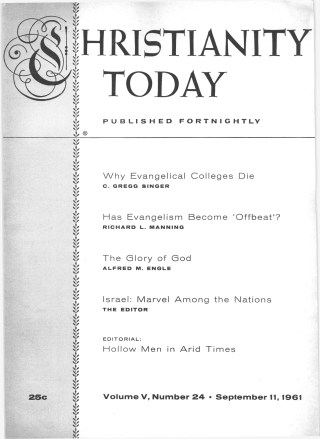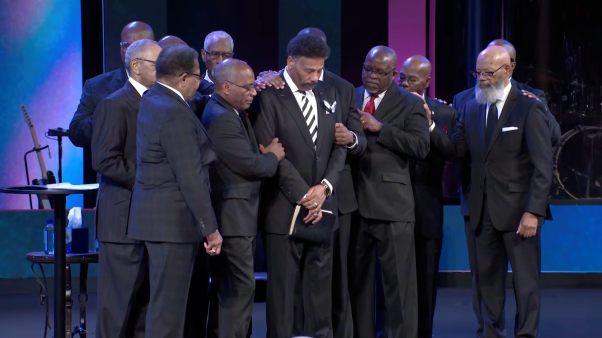Psalm 19
The Preacher:
Alfred M. Engle is Pastor of First Baptist Church of Ventura, California. Born in Virginia in 1908, he earned his B.A. degree from Wheaton College and then worked three years in a steel mill before preparing for the pulpit ministry. He received the Th.B. degree from Northern Baptist Theological Seminary in 1938, and took some graduate study at Wayne University, Detroit. He was ordained by the American Baptist Convention in 1935, and served churches in Illinois, Michigan and Arizona before coming to his present charge in 1956. He was moderator of the Santa Barbara Ministerial Association in 1959. Recently his church relocated in new properties valued at $315,000.
The Text:
The heavens declare the glory of God; and the firmament sheweth his handywork. Day unto day uttereth speech, and night unto night sheweth knowledge. There is no speech nor language where their voice is not heard. Their line is gone out through all the earth, and their words to the end of the world. In them hath he set a tabernacle for the sun, which is as a bridegroom, coming out of his chamber, and rejoiceth as a strong man to run a race. His going forth is from the end of the heaven, and his circuit unto the ends of it: and there is nothing hid from the heat thereof.
The law of the Lord is perfect, converting the soul: the testimony of the Lord is sure, making wise the simple. The statutes of the Lord are right, rejoicing the heart; the commandment of the Lord is pure, enlightening the eyes … The judgments of the Lord are true and righteous altogether.
God has chosen to reveal his glory to us in three wonderful ways: through the marvel of his creation, through the testimony of his Word, and through his work of redemption. The nineteenth Psalm gives us a glimpse of these.
IN MATERIAL CREATION
‘The heavens declare the glory of God, and the firmament showeth his handiwork” (verse 1).
The glory of God is declared by the beauty and mystery of the heavens, but there is more than that here. God has also permitted us, through modern discoveries in the field of astronomy, to behold more of his glory through the heavens.
Truly the heavens declare the glory of God through their great immensity or expanse.
Our greatest powers of imagination cannot adequately comprehend the vastness of God’s creation.
The astronomer measures the great distances of outer space in light-years. Since light travels at about 186,300 miles per second and there are 31.5 million seconds in a year, the distance of a light-year would be equal to 5.88 million million miles or almost 6 trillion miles. Scientists stretch our imagination by telling us that Capella, one of the stars that appears very bright to us, is 45 light-years away or 260 million million miles from us. Even the very nearest star, Alpha Centauri, is 4.3 light-years from us. If we were to represent the proportionate size of the sun as a mere dot on a piece of paper and the size of this star as another dot, these dots would have to be five miles apart. There are globular clusters consisting of tens of thousands of stars all of which are at least 20,000 light-years away. Think of it. Astronomers say that 300 light-years is only a step into outer space and that there are other galaxies that are at least 260 million light-years from us. This, too, is far beyond our ability to comprehend.
We hear much today of man’s great conquest of outer space; and we would not for a moment minimize the greatness of modern scientific discovery. But suppose that God does permit man to explore the moon, what has man really accomplished? The moon is only 1.3 light seconds from the earth. If a person were able to spend an entire lifetime traveling at the fantastic speed of light with no need to stop for refueling, he could not even reach out one step into the vastness of the creation of God.
The heavens declare the glory of God in the movement of the stars. It is marvelous to think of the billions of stars and planets moving in prescribed orbits, balanced in their movements with perfect mathematical precision. Knowing that he, the Creator, “hangeth the earth upon nothing,” we stand in reverence before him.
Not only is there this remarkable movement within prescribed orbits, but we are told that the universe is expanding at an unbelievable rate—stars are rushing out into what seems to us almost infinite distances. In searching some of the recent writings on this subject, we make the amazing discovery that those stars that are nearest to us are moving from us at a slower rate and those that are at the greatest distances are moving at a proportionately faster pace in relation to their distance from us. Some of those nearest to us are traveling at speeds of 20 to 62 miles per second; and by means of the recent radio telescope it is revealed that those farthest stars discernible (approximately 360 million light-years away) are retreating at the incomprehensible speed of 38,000 miles per second. The scientists have quite accurate means of measuring these movements by using the spectroscope and the newer radio telescope.
How great is the universe? Leading astronomers are saying that theoretically we may some day be able to observe those stars and galaxies so far away that they are receding from us at the speed of light. But they also tell us that anything moving faster than these bodies could perhaps never be observed because its signals could never reach us. These are so far away that the world could never investigate them. So, we ask almost breathlessly, how great is our God?
The heavens further declare the glory of God through the antiquity of the stars.
The proportionate increase in speed on the part of stars, in direct relation to their distances from us, leads to the intimation of a time of creation. It is gratifying to note that many of the recent books on astronomy speak of a creation, although to be sure, not all astronomers give God the glory for the work of creation.
Reference to a possible date of creation is made in the Encyclopedia Britannica Year Book for 1959. In discussing the movement of the stars away from us, the article says, “If this rate were interpreted as the expansion of the universe following a creation, the age of the universe would turn out to be greater than 7×109 years.” This would be 7 billion years. There is nothing in the first verse of Genesis to date God’s first great act in creation. As we think of these ages piled upon ages, we remember that David said, “From everlasting to everlasting thou art God” (Ps. 90:2).
The heavens also declare the glory of God in the magnitude or brilliance of the stars. The variation in the light given off by the stars is truly astonishing. Some of the stars are thousands of times brighter than the sun. Others are variable in their brightness; and the variety of color adds to the glory that we see in the heavens, for some stars are blue, some red, and some yellow. The blue stars are rotating most rapidly—some at the rate of 200 miles per second at their equators—and the red ones much slower, and the yellow ones the slowest of all. Our sun is a yellow star.
Then the heavens declare the glory of God in the law and order of creation. The writer of the book of Hebrews says of the Lord that “he upholdeth all things by the word of his power.” The context of this passage shows the glory of Christ as one with the glory of the Father. The orderliness with which all of the heavenly bodies work together is an evidence of the great design of him whose power is manifest in them.
The nineteenth Psalm goes on to show that the firmament showeth his handiwork. All the great expanse of the heavens is a witness, from the farthest stars right down to the air we breathe. It is not within the scope of this message to speak of the wonders of the atmosphere surrounding the earth. But we would not pass by this subject without saying that God has not failed in a single provision to make life possible and to provide for our comfort. How impossible it would be that all of these things could be brought into existence and operation without an intelligent Creator.
IN HIS WORD
The great, silent testimony of the heavens, however, magnificent as it may be, is not sufficient. Through the material creation we may know something of the wisdom and power of God, but we have no access to him. We cannot come to personal knowledge of him or discover whether a personal relationship with him is possible just by experiencing the created universe.
The nineteenth Psalm has not suddenly changed its theme at verse seven, as it might at first appear; our attention has simply been turned from the mute testimony of the heavens to the very intelligible witness of God s Word concerning his glory. He who created us capable of knowing and loving him is now revealing himself in terms that we can understand and receive. Here is not merely an impersonal expression of greatness but the very personal revelation of God in his relationship to man. How sinful and needy we are. How righteous and capable God is! The same One who has spoken through the skies above us is now speaking intimately in the Scriptures which he has placed in our hands.
Various terms are used here to designate the written word, such as the law, the testimony, the statutes, and the commandment. This Word of God is declared to be perfect, sure, right, pure, clean, true, and righteous altogether. Through it, God is seen converting the soul, making wise the simple, rejoicing the heart, enlightening the eyes, enduring forever, warning against sin, and rewarding those who keep his Word.
“The law of the Lord is perfect, converting the soul.” He who is perfect in his own nature and in all his decrees has caused us to see how far short of the glory of God we have come. A man may be made to marvel at the works of God in creation, but he can be converted only as the Spirit of God draws him through the instrumentality of the Word.
The testimony of the Lord is sure, making wise the simple.” There is no room left for doubt here. The sincere soul may know him with certainty.
“The statutes of the Lord are right, rejoicing the heart.” Those who invent their own gods seek to invent their own standards of right and wrong. To the self-willed the statutes of the Lord are a source of distress, but to the converted soul they are the source of rejoicing. He who loves the Lord delights in his Word.
“The commandment of the Lord is pure, enlightening the eyes.” Testimony to its power is seen in the enlightment it brings to individual lives and even to nations whenever the Word of God is received in its purity.
“The fear of the Lord is clean, enduring forever.” In sharp contrast to the heathen ceremonies of past centuries and of the present stands the reverence for God in its cleanness. There is nothing degrading in the worship of the Lord. Certainly this Scripture intimates not only that God is eternally deserving of reverential awe but that the soul that so honors him shall also endure forever. This does not mean simply duration but the quality that is enduring. The New Testament tells the secret of this eternal life: it is “Christ in you, the hope of glory.”
Here is something “more to be desired than gold.” Here is that which is “sweeter than honey and the honeycomb.” But how may we know it in experience? Is it possible for us, who come so far short of the glory of God, who stand before the Holy One convicted of our sins—is it possible for us to be acceptable in his sight? Look at the close of the Psalm.
IN THE WORK OF REDEMPTION
“O Lord, my strength and my redeemer”—what wonderful words these are with which to declare his glory. In my weakness he is my strength. But give thought also to the other expression, “my redeemer.” It speaks of restoration, purchase, release! We who are living, not as the psalmist long before the Redeemer came, but in this present time, have seen the fulfillment of the written Word in the living Word, Jesus Christ, who is our Strength and Redeemer.
To enter into this wonderful relationship with God, the psalmist begins with a plea for cleansing, as we see in verse 12. He stands in awe of the righteousness of God and is keenly aware of his own sinfulness. He asks for the cleansing of his life from these secret faults. He asks to be restrained from the sins of arrogance, that he shall not be dominated by them.
Comment On The Sermon
The sermon “The Glory of God” was nominated for CHRISTIANITY TODAY’S Select Sermon Series by Dr. Clarence S. Roddy, Professor of Practical Theology in Fuller Theological Seminary. Dr. Roddy’s comment fellows:
In my search for a sermon representative of modern evangelical preaching, I found myself, with about 500 others, sharing a morning worship service of the First Baptist Church in Ventura, California. The service rang with spiritual vitality from the beginning to the amen. The pastor, the Reverend A. M. Engle, led the people in a reverent and compassionate voice through the opening phases of the sendee into the sermon which I have selected here.
In the past few years it has been my lot to listen to many sermons in the so-called “average churches” of this country and abroad, and I find it difficult to concur with the opinions of those who forever decry the preaching in our churches. In fact, I doubt if we have ever had a higher standard, or that there was ever a time when our people were exposed to more thoughtful and relevant preaching. The power of the average pulpit is not be judged by the homiletical prowess of a few outstanding pulpiteers and thinkers.
I find this sermon representative of the best being presented in our churches every Sunday. Let us note a few of its qualities. First, it is biblical. It is what the old school homileticians termed expository. To feel the strength that comes from being exposed to a solid portion of God’s Word is a real joy. Such a sermon carries with it the ring of authority. Without doubt, expository preaching is an area where even the so-called “great” pulpits of America could improve.
The movement of the sermon is clear, simple, and progressive. It is logical in its development, does not meander from Dan to Beersheba with a detour to Damascus. James Denny once remarked that the three essentials of a good sermon are first—clarity, second—clarity, and third—clarity.
The objective of the sermon is readily grasped, for the preacher starts with the people where they are and then leads them to their Redeemer. Courtland Myers used to say that the ideal sermon is one that began at the level of the people and always led them to the foot of the Cross. By that standard this sermon rates high.
The sermon is relevant. On every hand we are confronted with the subject of space. Many expressions of God’s place in this “new age” of space have been heard, some wise and some not so wise. This preacher did not indulge in a lot of speculative verbiage but assumed with the Bible the God of the universe, and the universe as expressive of his majesty, glory, and power. This the sermon expounds without pedantry or sophistry. His knowledge of the field is evident and is used with restraint. It is dangerous for preachers to talk too “wisely” in the fields of science. But this man’s insight into man’s conquests of space, the earth and moon satellites in reference to the vastness of the universe was appreciated by all, even college students.
The sermon does not get bogged down, however, in the material universe (a real homiletical temptation) but proceeds with the psalm to the Word of God written and its ministry to man in the moral order. The sermon reveals the wonders of the Word of God with freshness and vitality. Note the force in the rather short sentences. Observe the simple but adequate vocabulary. It is the language of the laity, not the technical jargon of the scholastic. It communicates!
Using Spurgeon’s “element of surprise,” the message, almost with abruptness, confronts the hearer with Christ as his Strength and Redeemer. It is a fitting climax to a fine, down-to-earth message on a grand and glorious theme. As I left the church, I could hardly keep from singing aloud, “Then sings my soul, my Saviour God to thee, How great thou art, how great thou art!”
C.S.R.
There is a way which a man can be upright and innocent from the great transgression. We know that the greatest sin against God is the failure to believe in him and to glorify him.
And so this Psalm closes with a prayer to the Redeemer whom the New Testament reveals to be the Son of God, Jesus Christ our Saviour and Lord, who gave his life for our sins. The great cry of this believing heart is uttered in these words: “Let the words of my mouth, and the meditation of my heart be acceptable in thy sight, O Lord, my strength and my redeemer.”
It is only by the grace of God and through the power of the new creation in the heart of the believer that the innermost thoughts and the outward expression can be acceptable in his sight.
Thus is his glory revealed.
As we look up into the heavens we say, “O Lord, how manifold are thy works! In wisdom hast thou made them all” (Ps. 104:24).
As we search the Scriptures we are convinced that “the word of the Lord endureth forever. And this is the word which by the gospel is preached unto you” (1 Pet. 1:25).
As we behold our Redeemer we confess with a faith that issues in salvation, “God, who commanded the light to shine out of darkness, hath shined in our hearts, to give the light of the knowledge of the glory of God in the face of Jesus Christ” (2 Cor. 4:6).
Samuel M. Shoemaker is the author of a number of popular books and the gifted Rector of Calvary Episcopal Church in Pittsburgh. He is known for his effective leadership of laymen and his deeply spiritual approach to all vital issues.










